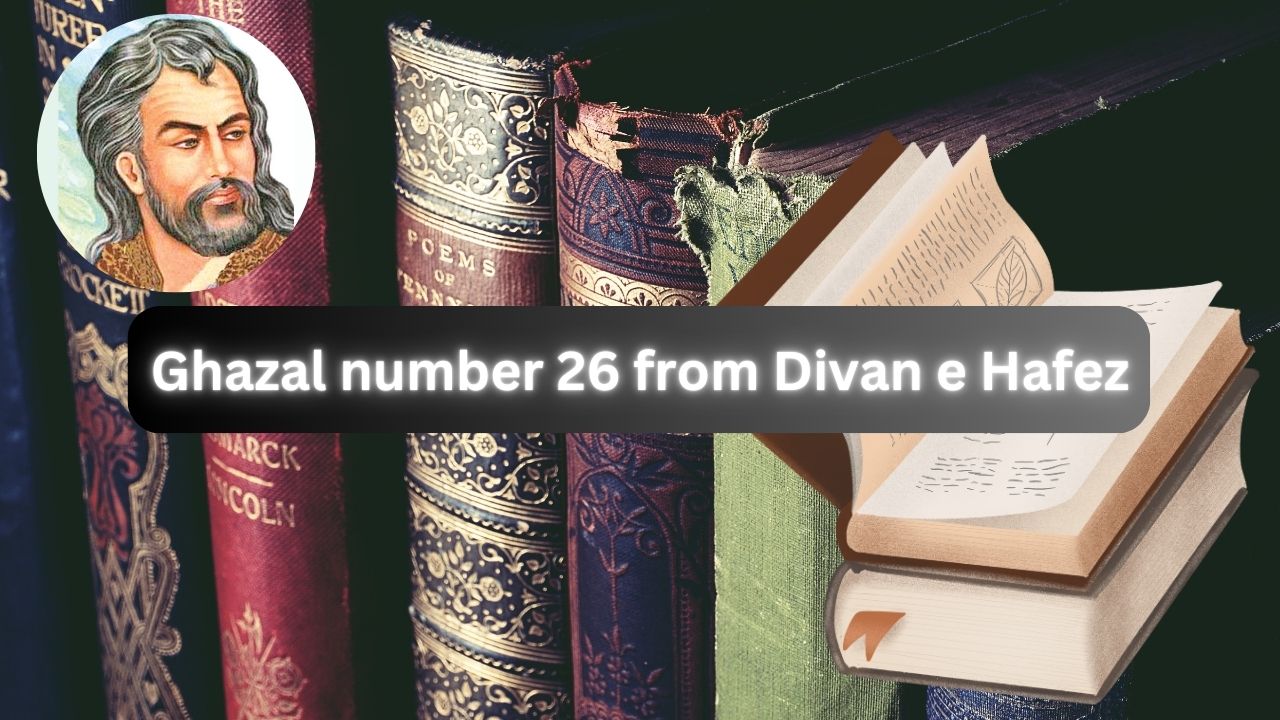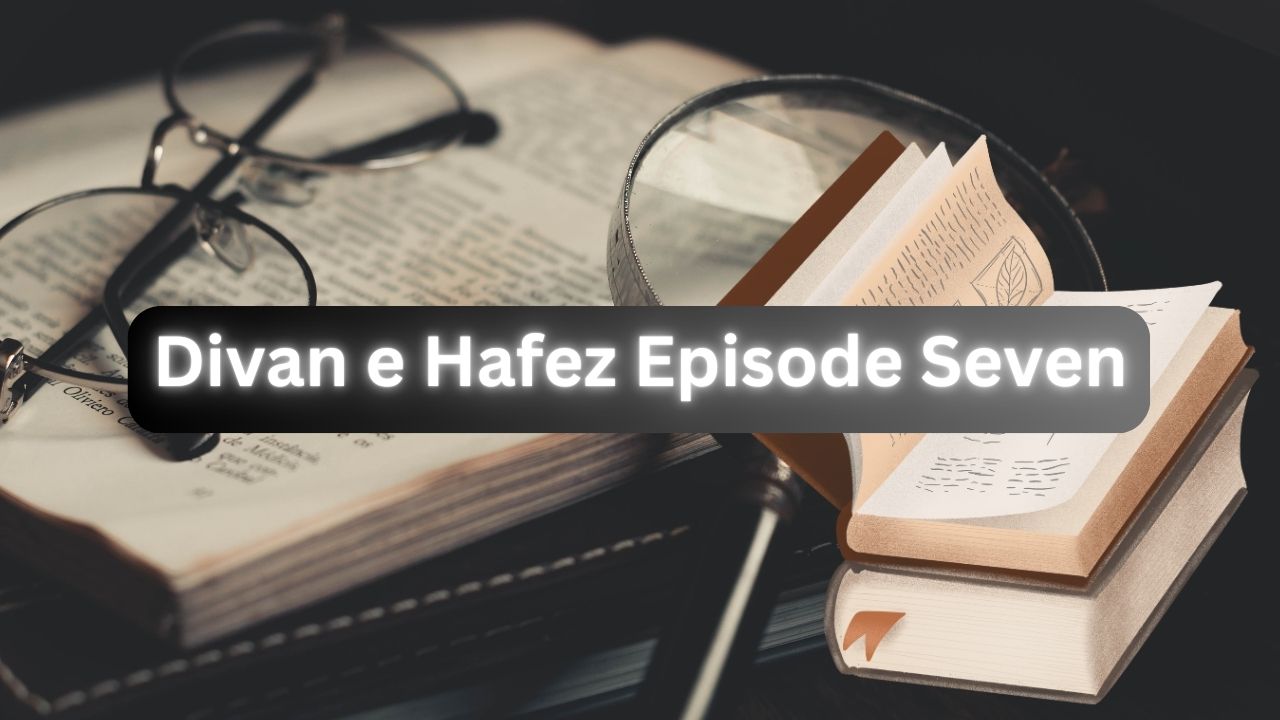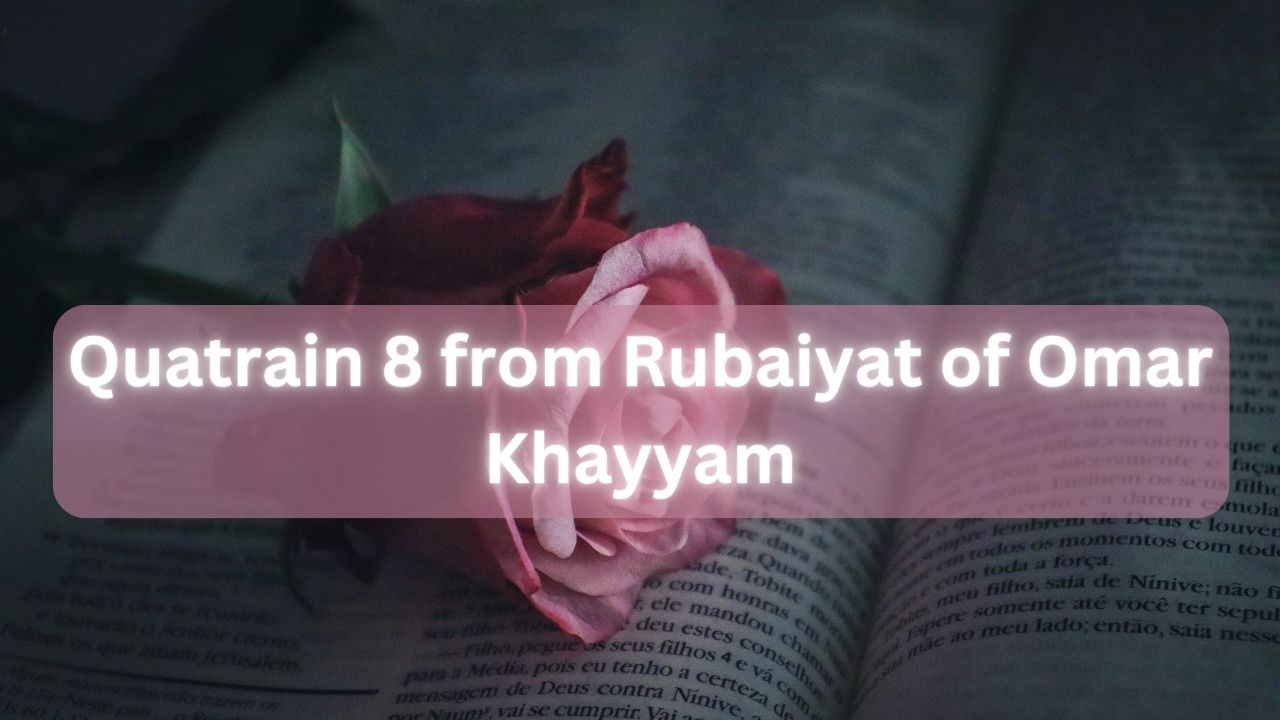Hafez, one of the most celebrated Persian poets, is renowned for his profound and evocative ghazals that shows themes of love, spirituality, and the human condition. In this particular ghazal, Hafez paints a vivid picture of a nocturnal encounter with his beloved. The imagery is rich and detailed, capturing the beloved’s disheveled hair, sweat-soaked face, and the intoxicating presence of wine. Through this encounter, Hafez explores the depths of love, the allure of the beloved, and the inevitable breaking of vows in the face of such overwhelming beauty and emotion.
The ghazal begins with a striking description of the beloved, setting the tone for a night filled with passion and longing. As the beloved sits by the poet’s bedside, their intimate conversation reveals the sorrow and joy intertwined in the experience of love. Hafez’s masterful use of metaphor and symbolism invites readers to reflect on the nature of desire and the spiritual journey of the lover.
This ghazal is a testament to Hafez’s ability to blend the mystical with the mundane, creating a timeless piece that resonates with readers across generations. It is a celebration of love’s power to transcend the ordinary and touch the divine, a theme that is central to much of Hafez’s work.
زلفآشفته و خِوی کرده و خندان لب و مست
پیرهن چاک و غزل خوان و صُراحی در دست
With disheveled hair, sweat-soaked, laughing lips, and drunk, Shirt torn, singing ghazals, and a wine jug in hand.
نرگسش عَربده جوی و لبش افسوس کنان
نیم شب، دوش به بالین من آمد، بنشست
Her narcissus eyes quarrelsome, her lips regretful, At midnight, last night, she came to my bedside and sat.
سر فرا گوش من آورد به آوازِ حزین
گفت: ای عاشقِ دیرینهٔ من، خوابت هست؟
She brought her head close to my ear and in a sad voice, Said: “O my long-time lover, are you asleep?”
عاشقی را که چنین بادهٔ شبگیر دهند
کافر عشق بُوَد گر نشود باده پرست
A lover who is given such early morning wine, Would be an infidel to love if he does not become a wine worshipper.
برو ای زاهد و بر دُردکشان خرده مگیر
که ندادند جز این تُحفه به ما روزِ الست
Go, O ascetic, and do not blame the wine drinkers, For this gift was given to us on the day of eternity.
آن چه او ریخت به پیمانهٔ ما نوشیدیم
اگر از خَمرِ بهشت است وگر بادهٔ مست
Whatever she poured into our cup, we drank, Whether it is the wine of paradise or the intoxicating wine.
خندهٔ جامِ می و زلفِ گرهگیرِ نگار
ای بسا توبه که چون توبه حافظ بشکست
The laughter of the wine glass and the tangled curls of the beloved, Many a repentance like that of Hafez has been broken.
زلف آشفته و خوی کرده و خندان لب و مست
پیرهن چاک و غزل خوان و صراحی در دست
"زلف آشفته" باید بدون کسره یعنی ف ساکن خوانده شد.
خوی: خَی خوانده می شود به معنای عرق و خوی کرده به معنای عرق بر چهره نشسته است.
پیرهن چاک: یقه باز
صُراحی: شیشه و جام شراب.
معنی بیت: شاعر معشوق خویش را مشاهده نموده که : با گیسوانِ پریشان، با پیراهنی سینه چاک، درحالی که دانه های عرق بر رخسارش نشسته و جامی از شراب در دست گرفته به نزد او آمده است.
With disheveled hair, sweat-soaked, laughing lips, and drunk, Shirt torn, singing ghazals, and a wine jug in hand.
Explanation: The poet describes his beloved with disheveled hair, a torn shirt, sweat on her face, and a wine jug in her hand, coming to him.
نرگسش عَربده جوی و لبش افسوس کنان
نیم شب دوش به بالین من آمد بنشست
نرگسش: چشمانش
عربده جو: ستیزه جو، جنگی، بدمست که تنها در چشم عاشق زیبا بنظرمی رسد و به زیبایی ِ او می افزاید نه درچشم دیگران.
افسوس کنان: دریغ گویان. امّا منظور شاعر از افسوس کنان، توصیفِ حالتِ لبهای معشوق است که بصورت غنچه درآمده و حسّ بوسه گرفتن یا بوسه دادن القا می کند.
معنی بیت: در ادامه ی سخن، چشمانش ستیزه جو و لبانش به حالتِ بوسه غنچه کرده، دلبرانه بر سر بالین من آمد و بنشست.
Her narcissus eyes quarrelsome, her lips regretful, At midnight, last night, she came to my bedside and sat.
Explanation: Her eyes are quarrelsome and her lips are regretful, but the poet means her lips are shaped like a bud, evoking a sense of kissing. She came to his bedside at midnight and sat.
سر فرا گوش ِ من آورد به آواز حزین
گفت ای عاشق دیرینه من خوابت هست؟
آواز حزین: محزون، غمگین، آوازی در دستگاه موسیقی گرم و دلنشین با چاشنی غمگینی.
دیرینه: قدیمی.
خوابت هست؟: آیا می توانی بخوابی؟
معنی بیت: پس از آنکه بر بالین من نشست، آرام سر درگوش من کرد و به آوازی دلپذیر و غمگنانه از من پرسید: ای عاشق قدیمی من، آیا از غم و اندوهِ عشق، خواب به چشمانت می آید؟
She brought her head close to my ear and in a sad voice, Said: “O my long-time lover, are you asleep?”
Explanation: After sitting by his bedside, she brought her head close to his ear and in a sad, melodious voice asked if he could sleep despite the sorrow of love. How could he fell asleep if he was truly in love with her?
عاشقی را که چنین باده ی شبگیر دهند
کافر عشق بود گر نشود باده پرست
باده شبگیر: باده ای که شب هنگام بنوشند. منظورهمان باده ایست که معشوق آورده است. البته اگر هم باده ای نمی آورد، همین دلجویی که از عاشق کرده، برای عاشق مستی بخش تر از باده هست.
کافر: انکارکننده، مُنکر
معنی بیت: برای هرعاشقی که اینچنین درنیمه ی شب، معشوق بااین حالتِ دلسِتانانه شراب بدهد، قطعاً اگر هم قبلاً باده نوش نبوده باشد از آن پس باده پرست می شود. اگرچنین نشود و باده پرست نگردد اینگونه عاشقِ بی ذوق را کافر عشق بخوان، اوعاشق نیست. من نیز در اثر این لطفِ معشوق است که باده پرست شده ام.
A lover who is given such early morning wine, Would be an infidel to love if he does not become a wine worshipper.
Explanation: For any lover who is given such wine at midnight by the beloved, if he does not become a wine worshipper, he is not a true lover. The poet implies that he has become a wine worshipper due to the beloved’s kindness.
برو ای زاهد و بر دُردکشان خُرده مَگیر
که ندادند جز این تُحفه به ما روز اَلست
دُردکشان: باده نوشانی که توانایی خریدِ شراب ناب و خالص را نداشته و ناگزیر، ته مانده ی شراب را که ارزان تر بود می خریدند و می نوشیدند.
تُحفَه: هدیه، اَرمغان
روزاَلست: روز خلقت
معنی بیت: ای زاهد اینقدر ما باده نوشان را ملامت و سرزنش نکن سرنوشتِ ما چنین رقم خورده و تحفه ای که ما در آغاز خلقت، ازساقی خلقت (خالق خویش) گرفته ایم همین باده بوده است.
Go, O ascetic, and do not blame the wine drinkers, For this gift was given to us on the day of eternity.
Explanation: The poet tells the ascetic not to blame the wine drinkers, as their fate was sealed on the day of creation, and the gift they received was wine.
آن چه او ریخت به پیمانه ی ما نوشیدیم
اگر از خَمر بهشت است و گر باده ی مست
خَمرِ بهشت: شراب بهشتی.
باده ی مست: شراب انگوری که ضمن آنکه مستی می بخشد خودش نیز مست است.
معنی بیت: روی ِ سخن همچنان با زاهدِ خودبین است. آن چه که خالق ما، ساقی و معشوق ما، در روز ازل به پیمانه ی ما ریخت ما نیز همان را نوشیدیم، نافرمانی نکردیم و تا آخرعمر برهمین منوال خواهد بود. حالا از شراب بهشتی بوده یا شراب انگوری یا هر چیز دیگر، برای ما تفاوتی نداشت ما لطف انگاشتیم و نوشیدیم.
Whatever she poured into our cup, we drank, Whether it is the wine of paradise or the intoxicating wine.
Explanation: The poet continues addressing the self-righteous ascetic, saying that whatever the beloved poured into their cup, they drank without question, whether it was the wine of paradise or intoxicating wine.
خنده ی جام مِی و زلفِ گره گیر نگار
ای بسا توبه که چون توبه ی حافظ بشکست
خنده ی جام: جلوه ی شراب، وَسوسه ی باده خواری، اشاره به دهان ِگشادِ پیاله است که به لب و دهانِ خندان تشبیه شده است.
زلفِ گِره گیر: مجعّد، پرپیچ و تاب. زلفِ حلقه حلقه ی یار که دل در میان آن گیر کرده و به دام می افتد.
معنی بیت: چهره خندانِ جامِ می(انگوری) و زلفِ حلقه حلقه و تابدار معشوق، چه بسیار وسوسه انگیزند و چه بسیار توبه هایی را مانندِ توبه ی حافظ شکستند!
The laughter of the wine glass and the tangled curls of the beloved, Many a repentance like that of Hafez has been broken.
Explanation: The sight of the wine glass and the beloved’s tangled curls are so tempting that many repentances, like those of Hafez, have been broken.
In conclusion, this ghazal by Hafez encapsulates the essence of his poetic genius, blending the ethereal with the earthly in a seamless dance of words. Through the vivid portrayal of a nocturnal visit from his beloved, Hafez describes the complexities of love, desire, and spiritual longing. The imagery of disheveled hair, sweat-soaked faces, and the intoxicating presence of wine serves as a metaphor for the tumultuous yet enchanting nature of love.
Hafez’s exploration of the lover’s journey, marked by moments of joy, sorrow, and inevitable surrender, resonates deeply with readers. The poet’s ability to capture the fleeting beauty of these moments and the profound impact they have on the human soul is a testament to his enduring legacy. This ghazal, like many of Hafez’s works, invites us to reflect on the transformative power of love and the delicate balance between devotion and desire.
As we reach the end of this poetic journey, we are reminded of the timeless wisdom embedded in Hafez’s verses. His words continue to inspire and captivate, offering solace and insight into the universal experience of love and longing. This ghazal stands as a beautiful reminder of the enduring power of poetry to touch our hearts and elevate our spirits.





